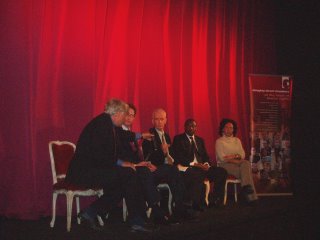Tuesday night saw yet another hugely successful packed screening of SHOOTING DOGS at The Everyman Cinema in Hampstead. Arranged in association with leading Human Rights lawyer Geoffrey Robertson QC and The Doughty Street Chambers, the film was screened to a full-house of lawyers, politicians and NGO representatives. These high profile events are proving hugely successful as platforms through which we can raise awareness of Shooting dogs. The Guardian even decided to report on the event. All that attended the screening remained in their seats as the film concluded, keen to discuss the issues raised by the film in the pursuing Q&A session. A number of interesting and important issues were raised in the discussion lead by a host of leading panelists: Geoffrey Robertson QC, Claver Gatete (The Rwandan Ambassador to the UK), Oona King (founder of The All-Party Parliamentary Group on The Great Lakes Regions and Genocide Prevention), Steven Crawshaw (UK Director of Human Rights Watch), and Guy Vassall-Adams (Barrister at The Doughty Street Chambers and author of the OXFAM report on the genocide).
Shooting Dogs won high acclaim from each of the panel members, described as the best and most important film based on the Rwandan genocide to date. These sentiments were echoed by President Kagame who watched the film in Kigali last week.
It was of the shared opinion that the film was capable of going a long way in raising awareness. Oona King pointed out and emphatically supported the central message that the film articulates as the most important factor in preventing future genocide - the importance and responsibility of the individual. To point blame after such a humanitarian crisis is of no consequence. It is the responsibility of the individual to be aware and to utilise all the power and influence within one's own personal sphere, however great or small that may be, no matter how far away from the crisis one may be, TO MAKE A DIFFERENCE.

The failure of the media at the time was brought up on a number of occasions, as was the fact that even today people are still unaware of the atrocities that took place there in 1994. Steven Crawshaw of Human Rights Watch talked of how the media constantly seems to avoid the current important issues until it is too late. The example he drew upon was of particular interest. He described how during the week of the 10 year commemoration of the Rwandan genocide in 2004, the papers were full of retrospectives on the Rwandan genocide. At this very point when the media was looking back at the world's failure in 1994, there was at that very moment, genocide taking place in Darfur. Darfur of course had no coverage.
Other topics covered were the successes and failings of gacaca as a way of bringing stability to Rwandan society, the culpability of Europe and King Leopald in initially installing the division between Hutu and Tutsi, and of course, the involvement (or lack of) of the British government in 1994.
If you would like to comment of any the issues raised at the event, please post your comments below. An audio file of the Q & A session should be available on the blog soon.
To read a PDF version of the event handout, click here.


0 Comments:
Post a Comment
<< Home